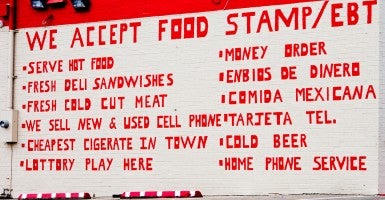States are ill equipped to detect and report food stamp fraud in the digital age, including attempts to sell benefits for cash, alcohol and other services, a new report says.
Much of the fraud occurs through social media and e-commerce websites such as Craigslist, the investigation by the Government Accountability Office found.
The GAO reviewed state and federal efforts to address fraud committed by recipients of food stamps, officially called the Supplemental Nutrition Assistance Program, which falls under the U.S. Department of Agriculture. The report noted:
The Office of Management and Budget has designated SNAP as a high-error program due to the estimated dollar amount in improper payments for fiscal year 2013.
In fiscal 2013, SNAP provided over $76 billion in benefits designed to help about 28 million Americans purchase food. On average, recipient households received about $275 a month in assistance.
>>> Commentary: Why Are Fewer People Using Food Stamps?
In the review, investigators discovered online postings of SNAP recipients offering the program’s Electronic Benefit Transfer (EBT) cards in exchange for other good and services. EBT cards operate like debit cards and require a pin number for access to benefits.
Examples of fraud identified in the report include:
- Nov. 29: “iPhone 5 black cracked screen works fine…purchase date of july 2013 so there is still Apple warranty…$350 or best offer…Trades for…Ebt card…”
- Dec. 2: “65 food stamps for $30 cash: Really need cash money for the other half of my phone bill…let you use my card and give the pin number…”
- Dec. 18: “Art for EBT: $10-$3,000”
- Dec. 19: “Catalytic converters for food stamps”
The misuse of food stamp benefits has been a “long-standing concern,” the GAO report says, while “technology has provided additional opportunities to commit and combat such activities.”
Rachel Sheffield, a policy analyst at The Heritage Foundation, said food stamp fraud actually is on the decline and the greater problem is the headlong increase in food stamp spending and recipients. She told The Daily Signal:
Food stamps overall is in major need of reform. It is one of the largest welfare programs and has grown rapidly over the last decade.
>>> Commentary: Big Bank? No Problem. You May Still Qualify for Food Stamps
GAO studied fraud in Texas, Florida, New Jersey and eight other states, selected based on the number of household recipients and other criteria.
Most of the selected states reported difficulty conducting fraud investigations because of limited staff and the growing number of recipients. Also, once state agencies identify fraud, they have difficulty prosecuting recipients and recovering overpayments.
“Some state officials suggested changing the financial incentives structure to help support the costs of investigating potential SNAP fraud,” the report said.
The report, published Aug. 21 and titled “Supplemental Nutrition Assistance Program: Enhanced Detection Tools and Reporting Could Improve Efforts to Combat Recipient Fraud,” calls for the Agriculture Department’s Food and Nutrition Service to:
- Explore ways that federal financial incentives can better support cost-effective anti-fraud activities by states.
- Establish more guidance to help analyze transaction data to identify food stamp households that obtain replacement cards for potential misuse.
- Reassess the effectiveness of the current guidance and tools recommended to states for monitoring e-commerce and social media websites.
- Offer assistance and training to enhance the consistency of what states report about anti-fraud activities.
Most importantly, Sheffield said, food stamps should be reformed to promote self-sufficiency through work:
Able-bodied adults should be required to work, prepare for work, or look for work in exchange for receiving assistance. This would change food stamps from a one-way handout to a program based on reciprocal obligation.
>>> Commentary: Americans Support Stronger Work Requirements for Food Stamps































